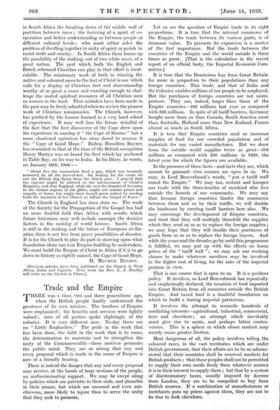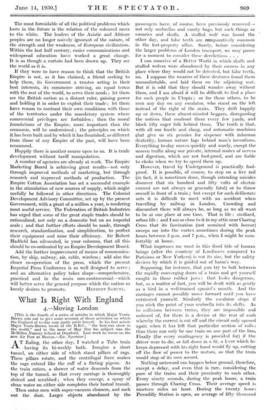Trade and the Empire
THERE was a time, two and three generations ago, when the British people hardly understood the greatness of its own mission. The burdens of Empire were emphasized ; the benefits and services were lightly valued ; men of all parties spoke slightingly of the colonies. It is very different now. To-day there are no " Little Englanders." The pride in the work that has been done, the faith in the work that is to come, the determination to maintain and to strengthen the unity of the Commonwealth—these motives permeate the public mind. They are so strong that any and every proposal which is made in the name of Empire is sure of a friendly hearing.
There is indeed the danger that any and every proposal may receive, at the hands of large sections of the people, an undiscriminating support. We may be swept along by policies which are patriotic in their ends, and plausible in their means, but which are unsound and even mis- chievous, more likely to injure than to serve the unity that they seek to promote. Let us see the question of Empire trade in its right proportions. It is true that the internal commerce of the Empire, the trade between, its various parts, is of immense value. To promote its expansion is a matter of the first importance. But the trade between the countries of the Empire and the world outside is three times as great. (That is the calculation in the recent report of an official body, the Imperial Economic Coml. mittee.) It is true that the Dominions buy from Great Britain far more in proportion to their populations than any foreign countries. This trade, and that of India and the Colonies, enables millions of our people to be employed. But the purchases of foreign countries are not unim- portant. They are, indeed, larger than those of the Empire countries-405 millions last year as compared with 325 millions. In spite of all tariff barriers, Germany bought more from us than Canada, South America more than Australia, Holland more than New Zealand, France almost as much as South Africa.
It is true that Empire countries send us immense supplies of food for our crowded population and of materials for our varied manufactures. But we draw from the outside world supplies twice as great-513 millions as compared with 258 millions in 1928, the latest year for which the figures are available.
In the presence of these facts—and facts they are, which cannot be gainsaid—two courses are open to us. We may, in Lord Beaverbrook's words, " put a tariff wall round the Empire." We may tax, restrict and hamper our trade with the three-fourths of mankind who live outside the bounds of our community. We may say that because foreign countries hinder the commerce between them and us by their tariffs, we will double the hindrance by erecting tariff barriers here also. We may encourage the development of Empire countries, and trust that they will multiply threefold the supplies which they send us so as to replace the foreign supplies ; we may hope that they will double their purchases of goods from us so as to replace the foreign buyers. And while the years and the decades go by until this programme is fulfilled, we may put up with the effects on home prices of the " tariff wall " ; we may ask our working classes to make whatever sacrifices may be involved in the higher cost of living, for the sake of the imperial purpose in view.
That is one course that is open to us. It is a perilous policy. It involves, as Lord Beaverbrook has repeatedly and emphatically declared, the taxation of food imported into Great Britain from all countries outside the British Empire. And taxed food is a doubtful foundation on which to build a lasting imperial patriotism.
It involves the attempt to reconcile hundreds of conflicting interests—agricultural, industrial, commercial, here and elsewhere ; an attempt which inevitably must give rise to acute, and perhaps bitter contro- versies. This is a sphere in which closer contact may merely mean greater friction.
Most dangerous of all, the policy involves telling the coloured races, in the vast territories which are under British government, that their affairs are to be so admini- stered that their countries shall be reserved markets for British products ; that these peoples shall not be permitted to supply their own needs freely from whatever sources it is to their interest to supply them ; but that by a system of discriminatory taxes, usually imposed by decrees from London, they are to be compelled to buy from British sources. If a combination of manufacturers or merchants puts up prices against them, they are not to be free to look elsewhere. The most formidable of all the political problems which loom in the future is the relation of the coloured races to the white. The leaders of the Asiatic and African peoples are no longer naively ignorant of the nature, of the strength and the weakness, of European civilization, Within the last half century, easier communications and widespread education have worked a great change. It is as though a curtain had been drawn up. They see the world as it is.
If they were to have reason to think that the British Empire is not, as it has claimed, a friend seeking to help them, its Government a trustee acting in their best interests, its commerce striving, on equal terms with the rest of the world, to serve their needs ; let them see the British nation as a distant ruler, gaining power and holding it in order to exploit their trade ; let them have reason to contrast their own conditions with those of the territories under the mandatory system where commercial privileges are forbidden ; then the moral foundations of the Empire, more important than the economic, will be undermined ; the principles on which it has been built and by which it has flourished, so different from -those of any Empire of the past, will have been renounced.
Happily there is another course open to us. It is trade development without tariff manipulation.
A number of agencies are already at work. The Empire Marketing Board is achieving great results—not only through improved methods of marketing, but through research and improved methods of production. The Empire Cotton Association has set a successful example in the stimulation of new sources of supply, which might usefully be followed in other directions. The Colonial Development Advisory Committee, set up by the present Government, with a grant of a million a year, is rendering most useful service. The Federation of British Industries has urged that some of the great staple trades should be rationalized, not only on a domestic but on an imperial scale ; and that further efforts should be made, through research, standardization, and simplification, to perfect their equipment and raise their efficiency. Sir Robert Hadfield has advocated, in your columns, that all this should be co-ordinated by an Empire Development Board. Add the further improvement of means of communica- tion, by ship, railway, air, cable, wireless ; add also the closer co-operation of the press, which the present Imperial Press Conference is so well designed to serve ; and an alternative policy takes shape—comprehensive, practical and in the main non-controversial—which will better serve the general purpose which the nation so



































 Previous page
Previous page